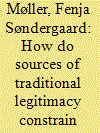| Srl | Item |
| 1 |
ID:
165197


|
|
|
|
|
| Summary/Abstract |
Research concerning authoritarian stability and peace usually investigates co-optation and repression. Recently, several studies argue that traditional legitimacy is also important for stability in monarchies. However, existing research rarely considers how legitimacy constrains rebellions and help the royal family to stay in power. Hence, this article explores the causal links between sources of traditional legitimacy and absence of uprisings. The study investigates the relationship with a case study of the Kingdom of Swaziland. In line with my expectations, I find a causal relationship between sources of traditional legitimacy and absence of popular uprisings. First, the royal family actively uses traditional legitimacy to justify their rule. Second, the Afrobarometer indicates that the Swazi people trust the King more than citizens in other African countries trust their head of state. Third, opposition actors have limited opportunities to mobilize the broader population against the monarchy. Fourth, traditional legitimacy dampens ongoing protests and thereby hinders their escalation into popular uprisings or political violence. Repression is clearly an important explanation for limited rebellion in Swaziland, but this article shows that also traditional legitimacy sources play a role
|
|
|
|
|
|
|
|
|
|
|
|
|
|
|
|
| 2 |
ID:
149447


|
|
|
|
|
| Summary/Abstract |
This article evaluates the aftermath of the Arab Spring through the dual optic of a regional phenomenon and a series of country narratives. These narratives are categorised by reference first to the secular states that found a path to stability after experiencing strong uprisings that drove rulers from power, second to the states in which the uprisings generated prolonged resistance and continuing acute instability, and third to the monarchies that neutralised the uprisings at their inception and restored stability. When other dimensions of conflict are taken into account, it seems likely that the Middle East will continue to experience chaos, intervention and counterrevolution for years to come, and possibly even a second cycle of uprisings directed at the evolving order.
|
|
|
|
|
|
|
|
|
|
|
|
|
|
|
|